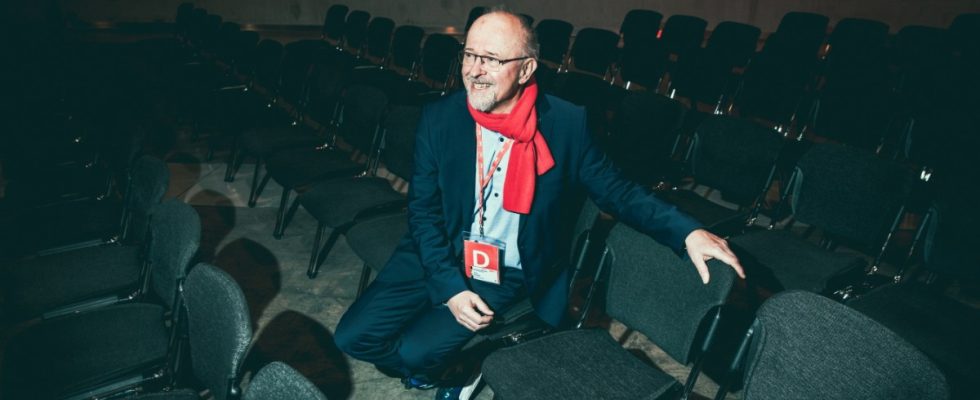There he sits again. At the back of a table in the City Cube in Berlin. The red scarf, which he can never be without in winter, wrapped around his neck. This is not the first time Axel Schäfer has been at a federal party conference of the SPD. It is his 50th time, initially as a guest, then as a delegate. He is probably the record holder among the 600 delegates. In 1969 Schäfer joined the party because of Willy Brandt. An old-school social democrat from the Ruhr area, Bochum has been his home for decades.
In the 1990s, Schäfer was a member of the European Parliament for one legislative period and has been a member of the German Bundestag for 21 years. A lot of party history comes together there. “Olaf Scholz is a more reserved guy, he doesn’t talk like I do,” says Axel Schäfer, leaning back calmly in his chair and adding: “That would be terrible.”
Schäfer demands clear language from the Chancellor
But he still wants clearer words from the Chancellor. Many at the grassroots level see Scholz as a mediator, says Schäfer, as someone who doesn’t communicate enough. They didn’t get the impression that he was fighting hard enough. Many MPs in the Bundestag faction are dissatisfied with the coalition. Schäfer belongs to the plain language department and, after the ruling from Karlsruhe on the unconstitutional supplementary budget, demanded that Scholz admit mistakes and give a big speech to the nation – many in the party found his government declaration in the Bundestag disappointing.
According to the ARD Deutschlandtrend, the Chancellor’s popularity ratings are at a record low and his SPD is only at 14 percent in surveys. “We just don’t seem as combative as demonstrated here at the party conference speeches, especially by Klingbeil and Heil,” says Schäfer.
The Social Democrat finds out exactly how his party is perceived in everyday life. When shopping, for example. Like recently when a saleswoman asked him why the SPD put up with this in the federal government. Why play “Cowboys and Indians”. The citizens’ perception is that the SPD has not yet been able to achieve what is important to the party in the coalition. “In some places we have not shown our coalition partners clear enough boundaries,” said Schäfer.
His first party conference 50 years ago was the most impressive
His first federal party conference was also the most spectacular of all. It took place in Hamburg in 1977 in the shadow of the German Autumn. Treasurer Wilhelm Dröscher died unexpectedly during the party conference at the age of just 57, shortly before he was to present his report as treasurer in the plenary session.
Schäfer remembers a speech by the Swiss writer Max Frisch. The now 71-year-old remembers that it was about intellectuals and social democracy in times of restricted civil liberties. Axel Schäfer still remembers that Frisch made demands on the party leadership. “That was unbelievable.”
Willy Brandt, Helmut Schmidt and Johannes Rau were sitting in the front row at the time. “Unfortunately not a woman.” But that has changed since the party conference in Münster in 1988. There the SPD decided on a binding women’s quota, and Schäfer voted for it. And a lot has happened since 1977: the SPD only has half as many members. The media plays a larger role. People look at their cell phones more, “back then you had to look into your eyes a lot more.” And: In the past, there were more local politicians and people from associations at the party conferences. “Of course they’re missing.”
Back in the present, the Social Democrat describes the traffic light coalition as an “experiment in everyday life.” Did the word of the coalition partners count for more in the past than it does today? Unfortunately, he couldn’t fundamentally contradict that. After all, the impression is sometimes reality. For example, that on the second day after an agreement, everything that was previously agreed upon or agreed upon is called into question again. “This is a form of profiling attempt,” summarizes Schäfer.
The Social Democrat believes it is unlikely that the FDP wants to provoke a break in the coalition with this behavior. She would only do that if, like Genscher did back then, she had an alternative and could jump to the CDU. On October 1, 1982, the Social Democratic Chancellor Helmut Schmidt was overthrown by a constructive vote of no confidence in the Bundestag. A few weeks earlier, the social-liberal coalition of Chancellor Helmut Schmidt (SPD) had broken up; at that time, the FDP had actually provoked the break. With the famous Lambsdorff paper, also known as divorce paper. The then Economics Minister Otto Graf Lambsdorff made suggestions for overcoming the weak growth and combating unemployment, which were entirely in line with the Union’s line.
One last question for Axel Schäfer: whether there was ever a moment when he wanted to turn his back on the party. A laugh. In the 51 years he has been married to his wife, there has never been a moment when he wanted to separate. “And since my wife believes that I love my party more than she does, you can imagine that this is inconceivable for me.”

